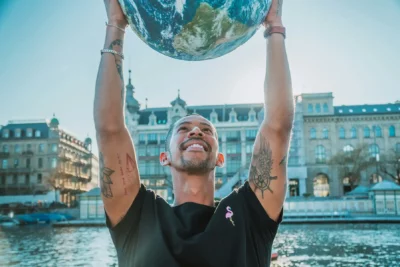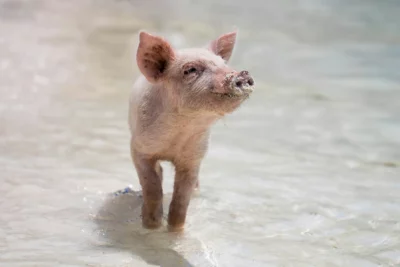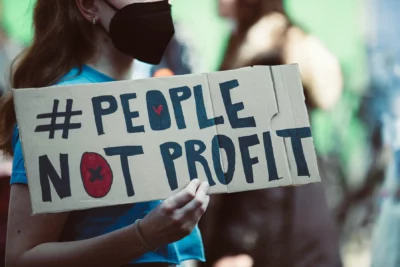As activists for social justice, we are often exposed to some of the most distressing knowledge and scenes imaginable. As a result, feelings of anger, hopelessness, and even guilt can overwhelm us, jeopardizing our emotional wellbeing and mental health. Here we recognize some of those feelings and gather together advice from experts and activists who have experienced them and gotten through.
Managing Anger
The American Psychological Society says that anger is a completely normal and natural emotion but how we express it can be problematic. Anger is often the first response when witnessing or learning of an injustice. And when that injustice is enormous, such as widespread damage to the planet or systemic cruelty inflicted on peoples or animals, there is a whole lot of justifiable anger that needs somewhere to go.
“In the years I worked on undercover investigations inside slaughterhouses, I felt so many challenging emotions,” says GenV’s Director of Communications and Campaigns, Kate Fowler, “and one of them was anger. Not just at the constant and distressing violence but at the entire system of buying, trading, and killing living beings.” Kate says she found that the best way to deal with this anger was through a two-step process. “When it was at its most acute, I’d pull on my trainers and get out for a run,” she says. “I’d run as fast and as far as I could, and once I had run the crisis out of me, I’d go back to my desk and be ready for step two: to channel that anger into creating meaningful change.” As John Lydon sang, anger is an energy, so we can try to harness that anger and use it for good.

Managing Hopelessness
The scale of the many injustices we face can naturally lead us at times into hopelessness and despair. We may feel as though we will never win and that the suffering and trauma will only worsen. But we are cautioned against seeing social justice progress in a binary way: win or lose; everything or nothing. Writes Paul Hoggett and Rosemary Randall: “In climate change work this manifests in the belief that ‘we must all act now or it will be too late,’ a belief that can all too quickly slip into the perception that it is already ‘too late’, and that processes have already been unleashed which are irreversibly leading us to catastrophe.” Instead, if we focus on what we can do to contribute to progress, and seek out others who are doing the same, we can mitigate feelings of hopelessness and prevent them from tipping us into despair.
This may mean stepping away from campaigning against something—at least for a period—and instead focus on contributing something positive to the cause. Volunteering at an environmental charity, a sanctuary, a food bank or soup kitchen, or a women’s refuge allows us to have a direct and tangible impact and feel we are making a real difference. Plus, we get to be around like-minded people who understand and share our feelings, and solidarity is a powerful antidote to hopelessness.

Managing Psychological Trauma
Sam Dubberley from Amnesty International, describes what is known as secondary trauma: “If you are exposed to distressing experiences, even when you are not physically present, your brain has the capacity to experience symptoms of distress similar to those you would experience if you had been there.”
So, trauma does not just occur when witnessing injustice firsthand; activists can experience it from seeing videos or still images, and even from reading about an issue. Often, we feel compelled to engage and see it as our duty to bear witness. But for those struggling with the material, a good rule of thumb is to ask ourselves, Is there anything constructive I can do with this information? If the answer is no, then consider disengaging. That may mean unfollowing certain accounts, asking charities not to send you graphic mailers, and logging off social media several hours before bedtime… or altogether. You can always re-connect when you are feeling stronger.

However much we decide to engage, it is important to carve out some time away from the issues. Laura Sainz, GenV’s Hispanic America Marketing Manager, shares what works for her: “I try and do stuff that is not related to veganism or the movement, like joining book clubs, attending gatherings with non-vegan friends or communities that you have interests in common with, watching fun movies or TV shows, seeking out funny memes, using coloring books or doing puzzles, practicing yoga asanas… all these things help me a lot.”
If trauma becomes acute, such as experiencing PTSD (post-traumatic stress disorder) or PITS (perpetration-induced traumatic stress), activists are advised to seek professional help. Charities like Mind also offer tips and advice, including on how to cope with flashbacks.

Managing Feelings of Guilt
The British Psychological Society says: “Guilt is linked not with an external event, but with our own behaviour, a sense we’ve done something we shouldn’t, or not done something we should’ve.” It is easy, therefore, to see why activists who are dedicated to a cause can experience this difficult emotion.
When we recognize the existence and impacts of a damaging activity or industry—whether that is animals suffering on farms, human rights abuses, or environmental destruction—we may feel guilt for not doing enough to stop it. But guilt can drive us to campaign in a way that is not sustainable, and that can lead to feelings of being overwhelmed and even burnout. If we feel guilty, it is important we find a way to acknowledge and accept three things:
- we are not responsible; we did not create this problem
- we are never going to be able to solve it on our own
- everything we can contribute towards its solution is meaningful
Managing Overwhelm
Activists are ordinary people who, when faced with an injustice, commit to doing something to end it. Often, that injustice is huge and systemic, and is driven by forces, events, and industries far more powerful than the activists themselves. Recognizing the enormity of the task, we may try to do more and more, committing as much time and energy as we can spare. But we find there is always more that needs to be done.
And the task grows and grows because once we see one injustice, it is likely we start to see them everywhere. Understanding the seriousness of climate breakdown, for example, can lead us to recognize the injustice of global poverty that is tied to a colonialist past and to environmental racism, which leads us to rampant destruction of Indigenous communities and lands by Big Oil and Big Meat, and then we are back to climate breakdown. We care about it all and it is easy to become overwhelmed by the scale and seriousness of what we face. So, how do we manage those feelings?
First, we can break down the issue into smaller parts and commit ourselves to just one aspect of it. We know we cannot do everything so finding one thing to focus on makes our activism more manageable. Then, we can take a moment to acknowledge the progress already made. When we see what has been achieved, we know that our work is not futile and that we can have an impact. And finally, we can let nature help us.
It is well documented that spending time in nature helps manage anxiety and improve mental health, and this is exactly what GenV’s Director Naomi Hallum turns to when things get tough. “Spending time in nature—hiking, trail running, or just strolling—without my phone or any electronic devices protects me from any unwelcome distractions, allows me to focus on my own thoughts, and reminds me of all the beauty in this world,” she says. “Plus, the exercise helps me destress and elevates my mood.”

Avoiding Burnout
The key to longevity as an activist is knowing your triggers, recognizing signs that you are struggling, and learning to act before things get out of control and we experience burnout.
Burnout is not a medical or mental health condition but, according to the World Health Organization, it is an ‘occupational phenomenon’. It is a state of physical, mental, and emotional exhaustion and can occur during periods of long-term stress or when we feel under constant pressure. There are physical, emotional, and behavioral signs that we are approaching or experiencing burnout. They include:
Physical
- Feeling tired most of the time
- Lowered immunity
- Frequent headaches, back pain, or muscle aches
- Insomnia or sleep disturbances
- Gastrointestinal issues such as nausea or loss of appetite
- Shortness of breath
Emotional
- Feeling helpless, trapped, or hopeless
- A sense of detachment, of being alone
- Self-doubt and feelings of failure
- Decreased motivation
- Loss of enjoyment
Behavior
- Difficulty concentrating
- Procrastinating and withdrawing from responsibilities
- Withdrawing from other people
- Becoming irritable and short-tempered
- Using food, drugs, or alcohol to cope
If we sense that we are starting to head down this path, it is important we act, but if we can build self-care into our daily routines, we may be able to avoid getting anywhere near to a state of burnout.

Jessica Gonzalez Castro, GenV’s Director of Hispanic America, recommends learning new sports or hobbies. “For me it’s pottery and free diving,” she says. “Free diving means connecting with sea life and another world. Not being able to hear anything but just looking at different colors, animals, and corals is really calming.”
Jessica also recommends spending time with loved ones. “Knowing I have the support of my family gives me confidence and I feel cared for. And I am also trying to find non-vegan friends because I need to talk about other things. In my free time I don’t talk about veganism at all. That has really helped me find out who I am besides being vegan and what I like.”

Conclusion
You may have noticed that every self-care activity recommended by the activists in this blog is low- or no-cost. That is because the things that make us feel centered, loved, and at peace tend not to make shareholders rich! Walking or running in nature, swimming in the ocean, being with friends and family, watching a movie, enjoying coloring books, doing yoga, learning pottery, and volunteering are all meaningful activities that bring something profound and positive into our lives. These are the things that help us manage difficult emotions and psychological traumas while protecting us from burning out. They allow us to keep working for a kinder, safer, healthier world for all, despite the emotional pressures we often face.



